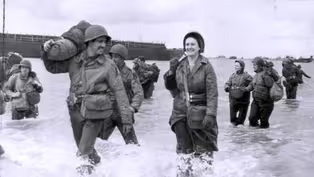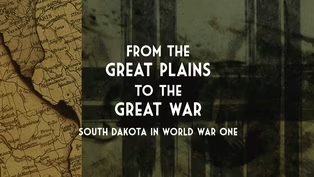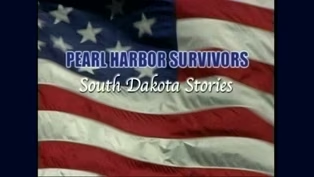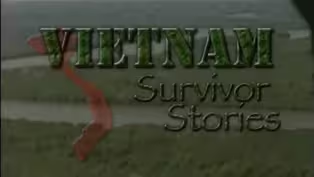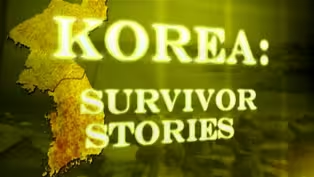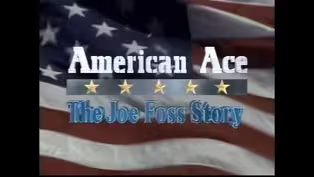SDPB Documentaries
South Dakota Heroes - World War II Stories
Special | 26m 59sVideo has Closed Captions
World War II stories that were shared with South Dakota Public Broadcasting in 2001.
World War II stories that were shared with South Dakota Public Broadcasting in 2001.
Problems playing video? | Closed Captioning Feedback
Problems playing video? | Closed Captioning Feedback
SDPB Documentaries is a local public television program presented by SDPB
Support SDPB with a gift to the Friends of South Dakota Public Broadcasting
SDPB Documentaries
South Dakota Heroes - World War II Stories
Special | 26m 59sVideo has Closed Captions
World War II stories that were shared with South Dakota Public Broadcasting in 2001.
Problems playing video? | Closed Captioning Feedback
How to Watch SDPB Documentaries
SDPB Documentaries is available to stream on pbs.org and the free PBS App, available on iPhone, Apple TV, Android TV, Android smartphones, Amazon Fire TV, Amazon Fire Tablet, Roku, Samsung Smart TV, and Vizio.
More from This Collection
War stories from South Dakotans
Swords & Plowshares - South Dakota & the Civil War
Video has Closed Captions
60-minute documentary about how South Dakota's Civil War veterans helped shape the state. (56m 45s)
Video has Closed Captions
WWII Army nurses are interviewed today about their experience in France in 1944. (53m 57s)
Video has Closed Captions
Vietnam War veterans recounting some of their most poignant memories of their time overseas (56m 59s)
Video has Closed Captions
An estimated 26,000 South Dakotans served in the Korean War. These are some of their stories. (57m 22s)
American Ace: The Joe Foss Story
Video has Closed Captions
The story of World War II ace & South Dakota Governor Joe Foss (57m 47s)
Providing Support for PBS.org
Learn Moreabout PBS online sponsorshipWhen you fly over a ship that has been sunk, there's probably 12 to 1500 in the water and all you save is 300.
It's a memory you can't forget in that short 5 or 10, 15 minutes.
We lost 13 of our 36 airplanes.
And it doesn't give you much time to get scared because you're busy trying to survive.
68,000 and South Dakota's men and women enrolled in the armed services during World War two.
Over 2000 of them made the ultimate sacrifice and never returned home.
Hello.
I'm Major General Phil Kelly, adjutant general of South Dakota.
During the war, South Dakotans rallied to the country's defense and provided support to the war effort on the Battlefronts and the home fronts.
We're losing thousands of veterans every day.
Not only are we losing our heroes, we're also losing their stories, their wisdom, and their experience.
With the help of a handful of veterans, South Dakota Public Television was able to capture some of those stories, so we may learn from them and share them with generations to come.
Here now are actual stories from some of South Dakota's heroes.
I was scheduled to finish my tour after 80 missions and on the 80th mission.
I just happened to go down to the flight line.
I wasn't scheduled that day, and the leader of the squadron became ill or something, and they asked me if I would leave the squadron, and I said, sure, I'll do this.
And my last mission.
So we were hitting an airfield over in, in Germany, about 100 miles east of the remote bridgehead, which had just recently been taken by the American soldiers.
And, well, the squadron circled, above.
I went down to look over the situation and, I strafed a bunch of planes and dropped, my bombs on, another section there, and then pulled up and told them to follow me on down.
And of course, when I made my second pass over there, they had that, they zeroed in on me.
And, and I had direct hits on the plane and set it on fire.
And I had to, bail out and, I evaded the Germans, for six days and traveled about 100 miles, traveling just at night to get back to the, near the American lines.
And I was within probably, a mile or two of a of the Americans when a German patrol, picked me up one night, I was, walked right into them, but it was kind of hectic.
And then, of course, my parents didn't know that I was safe until, the camp had been liberated and we had been processed and put on a ship that went to New York.
And after we landed in New York, I was able to, make a phone call to them and tell them, guess what?
I'm safe.
On the morning of December 6th, which was Saturday, I was going to aerial photo school at Wheeler Field, and, my squadron was over at Battle Field on the other side of the wall.
And I was waiting for our squadron commander who spent the weekend at Wheeler Field to come over.
And I'd fly back with his pilot to be with my buddies.
And we had been on alert the whole island for one week prior to that Saturday morning and Saturday morning, they called everybody in and all the planes were being lined up.
Row on the road at Wheeler Field, 150 some odd fighter planes, perfectly straight.
And while I was waiting, I jumped in the gas truck with the gas truck driver and I said, wouldn't this make a great target if the Japanese were to attack us?
I didn't know, but we had heard rumors that the Japanese might.
That night, I went to a dance in, Honolulu, met a young marine there, and I said, well, we'll see you here next week.
If the Japs don't attacked us.
No, I'm not telepathic or anything like that.
But we had heard talk.
But I honestly at the time did not believe that President Roosevelt knew about it.
But in the last few days has been several stories, particularly on the History Channel, indicating that Roosevelt had information and didn't pass it on to general, Shard and Admiral Kimmel.
And, if that's so, that's very unfortunate, because I was a great supporter of President Roosevelt.
Probably the most memorable, memorable incident was when they sent the Indian Air Force.
I was on Peleliu, and shortly thereafter during that period, they dropped the bomb at Nagasaki and Hiroshima.
Not too far off from the islands were.
And while many civilians and I don't favor atomic warfare, it was quite impressionable on a young man, 22 or 3 years old, that will always remember there when you fly over a ship that has been sunk, there's probably 12, 1300 in the water and all you save is 300.
If it's, a memory, you can't forget.
A war is is a no gain thing.
And, it's, I guess, mostly brought on by greed, by different people in different countries.
And we were fortunate, I think, that we did stop Hitler or he would have dominated Europe.
I think.
This flag comes out of Munich.
It's called the white colleagues flag, which means that there was a German war flag or a German battle flag after I was liberated from prison camp Lewisburg.
Stalag seven, a a young man whom I didn't know asked to borrow my jacket because he was going to it.
And when he came back, he says, I brought you a souvenir, and this is a souvenir he brought back from Munich.
So apparently it has been a flag that has been used by the Nazis in the battles.
It has been patched several times, so it's a well-worn flag.
But it came out of Munich in May 1945, and it reminds me of the difference between the flag of the United States and the flag of Nazi Germany.
The United States flag stands for freedom and justice and liberty for all.
This flag was a flag of oppression and tyranny that struck fear and terror in the hearts of people whenever they saw it, especially freedom loving countries as they were invaded by the Nazis during the 1939, 1940 and later.
I if I were to tell the student something, it would be that it is not free to be free.
The reason that they can drive their cars up and down the street is because they have been made free in our country.
And the, the cost of being free is expensive, both in money and in life.
And, I don't regret my experiences, but I hope that some of those living now who might have to do that again would feel that they should take, the experience of helping to make the country stay free.
There's a lot to be learned.
293 00:08:43,800 --> 00:08:45,600 In history and of all kinds, but particularly about the conflicts at hand.
Our country is.
And do, and do, face and and the many people who do and to give much of themselves in order to, preserve our liberty and, and our, and, our way of life.
And I think through reading history, they will gain a greater appreciation of those things.
And, and learn what it is to be an American and what it should mean to be an American.
So whenever I hear somebody say, oh, history's so boring, I just hate that makes me feel kind of bad, is that that's really the essence of your heritage, is to know where you came from.
Well, I was, storekeeper.
And a lot of people kind of mistake that storekeeper, but it was the payroll, department, and, my boot camp was in New York, and I took dark Cooper's, training in Milledgeville, Georgia.
And my, main station was the Naval Training Center in San Diego.
And, that was, during the war, and everything was strict there.
We had to be GI all the time because of the little recruits coming in.
Yeah, the new recruits, I should say, coming in.
And, we couldn't.
The World War two, waves could not go out of the continental United States.
We could not go aboard ship.
We could not talk to the officers.
But when we were down town, the officers come and talk to us because they said the enlisted gals for five more friendly than the officers.
I was over in Germany, in our division, the 69th Division, crossed through Germany and next, the Russian army coming from the other direction, FCL rumor.
So I was always, pretty proud of our division.
And then, the one that met the Russians because it and the war and, ve day was May 8th and the war in Germany was over, but our division was slated to go to Japan after, and finish the war against Japan.
But then, President Truman decided to drop the bomb on Hiroshima and, that ended that war.
And so, the war was over.
And, two weeks later, after VE day, I heard from my wife back in the States, and I had her new daughter.
One little girl I might tell you about, we run into in Germany.
She was standing in the middle of an intersection.
Had just a diaper and an upper part on crying our eyes out.
Completely lost a fellow buddy of mine from Boston, Minnesota.
Picked this little girl up, and she stayed with us for five days that night.
Eight ration for this road and half track with us.
And we finally got into a small town.
And the Burger Meister, who is the mayor and, the towns in Germany promised us faithfully that he would take that little girl and raise us.
To this day, we are wondering where she is.
I remember the morning that I went down over Austria, and I was awakened about 230 in the morning to go on the flight that day, I had a strong feeling that I wasn't coming back.
I almost, awakened my roommates, who are made to mine to tell them goodbye.
And then I thought, what a crazy fool they think I was to say, wake up at 230 in the morning and tell them I wasn't coming back.
But that was the day I didn't come back.
That they were flying, bomber mission over with a new start, which was up in the part of Austria.
And while we were on the bombing run, our plane was on fire, and we were told by the pilot of the plane to be prepared to jump.
And eventually we did jump because the plane was on fire and parachuted out over Austria.
I was a navigator on B-24 bombers.
I was arrested then and taken to, the air base in Vienna, and then from there to the, processing center, the interrogation center at Frankfurt, on the minds, and then sent to a camp, Stalag Luft three, Saigon, Germany, which is now a part of Poland, and then moved during the war as the Russians approach to stall.
Exactly.
Lewisburg, Germany, near Munich.
The hardest part of being a prisoner of war was certainly the uncertainty.
And then the time was long.
And, of course, little food, inadequate clothing and inadequate fuel for the barracks in the wintertime.
And then just the anxiety of of not knowing what was going to happen, being called out twice a day for roll call or more, and other irritating things which sometimes were, done by the Nazis, which seemed to us to be unnecessary.
That war is, a terrible way to solve the grievances and the problems between countries.
And they say that old men declare war.
Young men go off to battle and die.
And it, is although we've known more for centuries and centuries, it's, it's a poor way to settle the problems between countries.
With the help of veterans like Maurice Magnuson, Virgil Harriot and Ellsworth Wilkinson, we're able to learn about the truce of war and what a true hero is.
World War Two has become part of history.
Children all over America are taught about the war.
They learned why it happened and who it happened to.
Children read about the men and women who proudly served during the war and through the magic of television, are sometimes given a visual glimpse of war itself.
South Dakota Public Television gave several students across the state the opportunity to learn more about the war by actually asking questions of a World War Two veteran.
Some of our veterans then proudly answered those questions.
Here now are the questions and the answers.
As a soldier fighting in the Pacific theater, do you think it was right to drop the atomic bomb on Japan?
I would say yes.
It was right there.
We dropped it sooner and instead it dropped 3 or 4.
Wouldn't bothered me.
Well, I was, here in the States when they dropped the bomb, and Walla Walla was in town in the hospital, recuperating from my wounds.
So, was I just heard that they dropped the bomb, and I was glad that the war was over after that, that, whoops, didn't come home.
What is the most important thing kids my age can learn from your experience?
They should realize that war is is not, is not fun.
You know, you have interesting things that you do and so on.
But, sometimes we we may have to go in one way or another and defend the interests in our country.
And when this is done, you have to do even though your heart beats a little faster and you, you know, it changes sort of internally how you feel, but you realize that, as a citizen of this country, if you are, as a young person, selected, you know, and then that's what you should do, because we live in a free country, we want to keep it free.
And so you have responsibility in that way.
And so it comes to defending these rights, and you're called to do it.
You should do it.
How has the style of fighting changed from when you fought to today?
It's changed an awful lot from the time that I was in the service and World War two.
Nothing was automatic.
We didn't have pushbutton war where you could reach out and, set a computer, push a button and an intercontinental ballistic missile or a bomb would go exactly where you wanted it to.
We seen this in Desert Storm.
How they had guided, bombs or guided missiles is what they were.
An airplane could drop them and they could put them in a doorway during World War two.
You couldn't do that if you could, come close.
You was lucky.
But effective in order to has had on your life either positive or negative.
And why?
The people I served with in the South Pacific.
And over there, you've seen many, many die.
And it they did it so that we might live.
They sacrificed much more than us that return.
And it's a poor eulogy to those people that are buried there on Peleliu, where I was on for 11 months.
I think there's 1456 buried Marines there in my book, all voluntary.
I had pictures of them piled and put down, and those things to me will live there till I die.
Was there ever a time where you thought that you might not come home?
And how did you feel?
You didn't have time much to feel, You just did it as it came up.
When, The first German jet fighters hit us on New Year's Eve of 1944, and we weren't even briefed.
We didn't know what they were.
They went through us from back to front so fast, we didn't have any idea what what it was.
It was the new 262 Messerschmitt.
And in that, short 5 or 10, 15 minutes, we lost 13 of our 36 airplanes each.
Men each had 10 or 10 people aboard.
And it doesn't give you much time to get scared because you're busy trying to survive.
And when they came by, in the split second that you got to see them, they looked as though they were scared as we were.
When were you most afraid?
I was on guard duty.
No guard duty, I suppose.
They used three and three as much as they did artillery.
And the Japs come in the in parcels.
And he says shoot anything.
It will, cause he gave orders.
Nobody did go outside of their foxholes.
In the morning we found Japs in the water buffalo.
You water buffalo.
You get up.
They didn't take me to see.
It was the worst under.
A part of the war impacted you the most.
And why?
Well, I guess, there's so many incidents.
Probably the the thing that affected me the most was, we were at Okinawa and a kamikaze pilot flew into our ship, and he, he dropped his bomb and missed the ship, but he he flew is his plane right into the bridge of the ship which killed our skipper and our executive officer.
And a lot of, signalmen and and, and I guess that impacted me the most because, our ship was out of commission.
We had to steer from a different steerage, and they we went back to, Oakland, California for repairs.
And while I was in Oakland, California, the, V-J day happened, and, that was, of course, was the end of the war.
Strong arguments exist that, Roosevelt knew about the bombing of Pearl Harbor, and he let it happen so America could enter the war.
What's your opinion on this?
I do not believe that Roosevelt knew that they were.
That the Japanese intend to bomb Pearl Harbor.
Do you think that Marshall, General Marshall and John Starkey Washington and maybe the president and Secretary of State knew that we were close to war or were actually on the verge of war, and that they should have given Kimball and short, adequate warning and would probably saved a lot of lives.
What was it like fighting the war too long that any second you should die?
The only time that I ever felt like that was when we were, getting ready to invade Japan.
If we would have had to invade Japan, I'm sure the casualties would have been horrendous, because the Japanese people were not ready to give up, and they wouldn't have given up until a lot of them were killed, or where they couldn't find any longer.
There's been some discussion that President Truman shouldn't have dropped the atomic bomb.
But if you talk to anyone that was waiting to invade Japan at that time, I'm sure that that you won't find anyone that disagrees with that which should have been dropped in when it was if we had the bomb at that time, because it saved a tremendous amount of lives.
Both Japanese and American.
And then you see the effects and consequences of the war.
You're given the chance today to enlist in the same war again.
Would you do it?
If I felt that our country was being threatened, I wouldn't hesitate, I would, I would be ready to fight again.
We live in the best country in the world, and I think that all children growing up today need to realize that that's the case and should never pass up the opportunity to to serve the country.
It's a call comes up.
How did you feel when your friends or people knew you were being killed?
When we were bombed, and I think we were all praying that the bomber would go a little farther over before he dropped his bomb.
Which on Guadalcanal, we had a bomber command every night.
They call him Wash Machine.
Charlie one one lone bomber.
He would fly around and round, and then after a while, he decided to drop his bomb and go home.
But, the, you know, they had him.
We could see him in the searchlights.
So it it was kind of nerve wracking until he finally got out of there because he didn't know where he was going to drop it from.
As adjutant general of South Dakota, I'm proud to have the opportunity to bring you the true stories from some of South Dakota's own World War Two veterans.
For the many men and women who lost their lives, and for those who are still among us on behalf of South Dakota Public Television, thank you.


- Indie Films

A diverse offering of independently produced films that showcase people, places, and topic










About Damn Time: The Dory Women Of Grand Canyon (2025)

Support for PBS provided by:
SDPB Documentaries is a local public television program presented by SDPB
Support SDPB with a gift to the Friends of South Dakota Public Broadcasting

